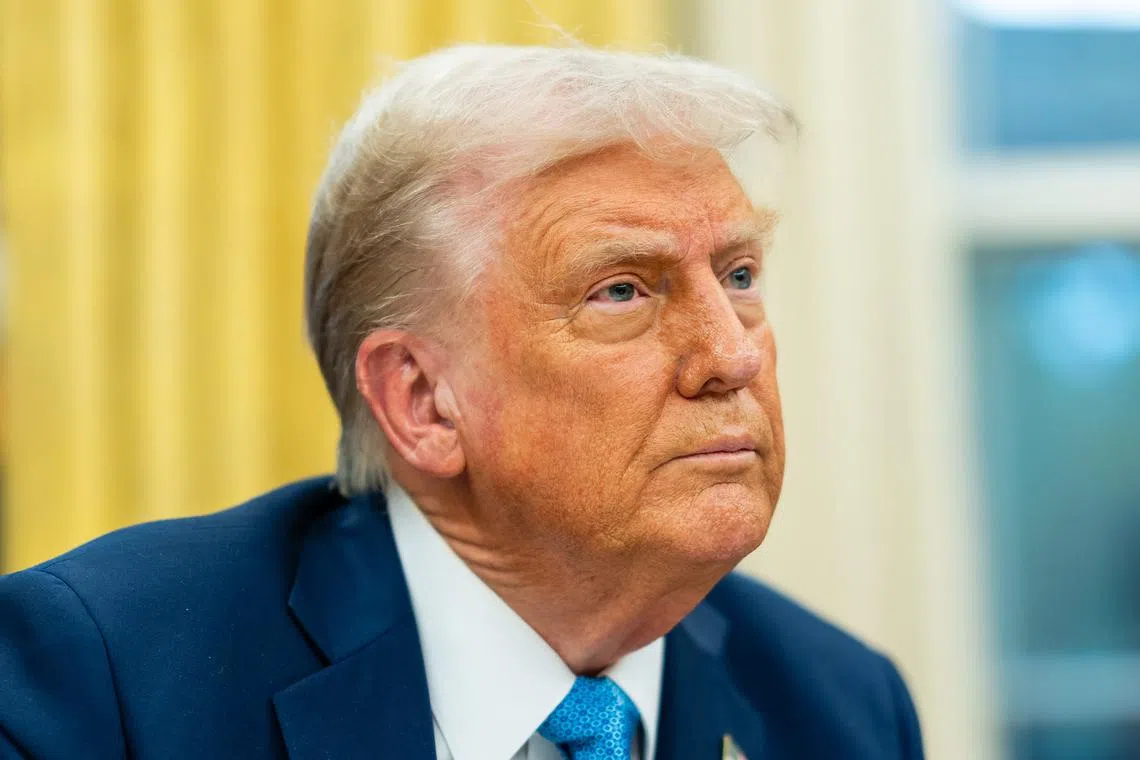Trump wrongly ended protections for Venezuelan migrants, US appeals court rules
Sign up now: Get ST's newsletters delivered to your inbox

US President Donald Trump took aim at Temporary Protected Status almost immediately in January.
PHOTO: ERIC LEE/NYTIMES
Zach Montague
Follow topic:
WASHINGTON – A federal appeals court on Aug 29 reaffirmed a lower court’s opinion that the Trump administration should not be able to end temporary legal protections for roughly 600,000 Venezuelan migrants already in the United States under a Biden-era programme.
While the decision offered a symbolic legal victory for immigrant rights groups that have fought the administration’s campaign to roll back those protections, it will most likely have no immediate practical effect. The Supreme Court ruled in May that the administration could for now deport the migrants while the legality of its policy was litigated.
The question of whether President Donald Trump can legally deport the hundreds of thousands of Venezuelans who had been offered safe haven under the programme has been making its way through the courts since he ended the program in February. The Supreme Court is almost certain to have the final say in how it will ultimately be resolved.
But in May, the justices intervened on an emergency basis, issuing a brief unsigned order that allows the administration to proceed with the deportations while the litigation continues.
The Aug 29 ruling was part of that litigation. It came from a three-judge panel of the US Court of Appeals for the 9th Circuit, which found unanimously that the administration could not undo an existing Temporary Protected Status designation, which Congress had devised to be “predictable, dependable and insulated from electoral politics”.
“No administration has attempted to vacate an existing temporary protection status designation in the 35 years in which the program has existed,” the opinion said.
Judge Kim McLane Wardlaw, a Clinton appointee, wrote the opinion. The panel also included Judge Salvador Mendoza Jr and Judge Anthony D. Johnstone, both Biden appointees.
In March, Judge Edward M. Chen of US District Court in San Francisco first halted the Trump administration’s efforts to immediately remove protections.
By the end of President Joe Biden’s term, the government had extended Temporary Protected Status to more than 600,000 Venezuelans in two rounds in 2021 and 2023. In January, the Biden administration extended the designation, allowing the Venezuelans to renew their status and remain in the country until October 2026.
The Trump administration has been working to revoke the extension, as well as Temporary Protected Status extended to migrants from other countries, sowing confusion that has only been compounded by the back-and-forth decisions in the courts.
The Temporary Protected Status programme, enacted by Congress and signed into law by President George H.W. Bush, allows migrants from nations that have experienced national disasters, armed conflicts or other extraordinary instabilities to live and work legally in the United States.
Mr Trump took aim at Temporary Protected Status almost immediately in January, seeking to end a program through which hundreds of thousands of people fleeing disaster or conflict in countries such as Haiti, Venezuela and Afghanistan have been able to work in the United States without fear of deportation.
Legal experts and advocates for the migrants noted that the Supreme Court’s brief order in May meant that hundreds of thousands of migrants were subject to deportation even though two courts had ruled that the Trump administration’s policy was not legal. They said it highlighted the problems with the Supreme Court intervening on an emergency basis with rulings that provided little accounting of the justices’ reasoning.
Ms Ahilan Arulanantham, a lawyer representing the immigrants, said two “comprehensive decisions” carefully explaining why the administration’s actions were illegal would have no effect “because of a two-paragraph unreasoned order the Supreme Court issued in May”.
“This is not how any rational legal system should work,” he said.
Prof Stephen I. Vladeck, a law professor at Georgetown University, said in an email that the case provided a “good example of the difficulties that arise when the Supreme Court grants emergency relief to the Trump administration without any explanation as to why”.
“Now, the Ninth Circuit has weighed in – and further endorsed the district court’s analysis,” he added. “That kicks the can right back to the justices – who, this time around, will presumably have to actually say something about whether the lower courts are right, and if not, why.”
The administration has complained that lower court judges are exceeding their authority by issuing rulings that appear to counter the Supreme Court’s signals about its views.
A spokesperson for the Department of Homeland Security said in an emailed statement that the Temporary Protected Status programme had been abused and that the decision “delays justice and undermines the integrity of our immigration system”.
“Under God, the people rule,” the statement said. “Unelected activist judges cannot stop the will of the American people for a safe and secure homeland.”
Migrants from Venezuela in particular have been targeted by Trump’s immigration policy.
Some have been spuriously accused of being affiliated with Tren de Aragua, a Venezuelan street gang, and sent to a notoriously violent confinement centre built to house people accused of terrorism in El Salvador.
Mr Trump has worked to justify that move by broadly characterising Venezuelans in the United States as criminal invaders, invoking an 18th-century wartime law to maximise his power to deport them.
Despite the intelligence community’s conclusions contradicting him, the president has further worked to characterise the gang as an organised foreign force supported by the Venezuelan government. NYTIMES

